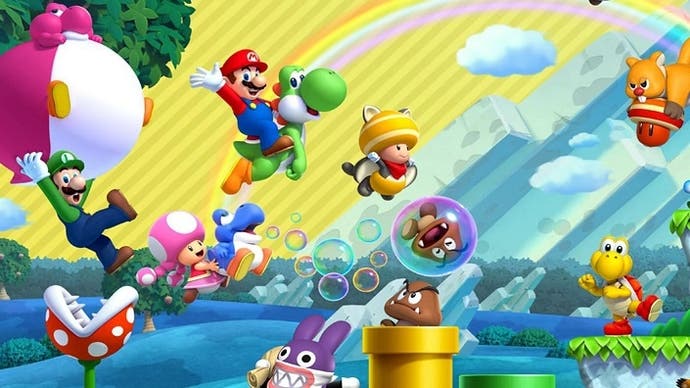How New Super Mario Bros U Deluxe on Switch improves over Wii U
A by-the-numbers port or something better?
What better way to kick off the new year? New Super Mario Bros U Deluxe on Switch is a complete version of the Wii U release, with some content upgrades and a smattering of visual tweaks to boot. As with so many highlights of Nintendo's last console, the original sadly got overlooked, despite being one of the series' best - and so it's great that Switch gets a conversion similar in scope to Mario Kart 8 Deluxe.
What's included? Well, the original game and its Luigi expansion are tied up into one package, and besides losing the Miiverse integration, everything else stays intact. Two new characters join from the start - Nabbit and Toadette - offering easier ways to get involved. Otherwise, this new release plays it relatively straight, but look under the hood, and there are a few more changes than you might at first expect.
Looking back, New Super Mario Bros has never really been Nintendo's most technically advanced series. Rather, it pays tribute to the mascot's legacy, going back to the template of Super Mario World on Super NES, in particular, with its map top-down layout. This is Nintendo's line to a rich tradition of 2D-game design, even if it's through a medium of 3D rendering, that would otherwise be lost to time.
That's not to say it rests on its laurels. The 2D sprite-work of Mario World is, for all its charms, ditched in favour of conventional 3D character modeling. The advantage here is it opens the gates to more modern lighting, and shader techniques for elements like water or lava. It's never overplayed, but lets fireballs and lamps properly illuminate nearby geometry. A parallax scrolling effect is also used on 2D background layers, just like the 16-bit days - meaning different layers move at different speeds to create an illusion of depth as you run. Super Mario Bros U - both Deluxe and the Wii U release - go a little further with a gaussian depth of field effect, and even light shafts. In fact many of the backgrounds use multiple layers, of clouds, jutting cliffs, and extra effects like snow, to build a sense of position in the foreground.
Looking to Nintendo's past glories this way, it shows perhaps an opportunity to deliver something more on Switch is missed in U Deluxe. The notion of this series using Super Mario Maker's instant tile-switching feature is tantalising - which let the player play a level, while also choosing style templates to mimic the NES original, Mario World, or current 3D offerings. Such an idea hasn't made the cut here. Regardless, this release still delivers a rich vein of quality that courses through every level. Enemies and platforms are exactly placed to encourage the speed-runner, while secret pipes reward exploration. It's Mario, refined. The visuals may not be groundbreaking or surprising, but they're an effective way to push some great game design.
In terms of the Switch port itself, we kick off with something of a mystery: the original Wii U package, including the Luigi expansion, comes to 13GB when bought from the eShop. When it comes to Switch though, it's trimmed down quite radically to just 2.5GB - around a fifth of the size. This is difficult to fathom, but Luigi was released as a standalone release, so it's possible that all of the assets were duplicated from the standard game. If that's the case, it's possible there's a needless doubling in game size on Wii U. There's no doubt more to this, and in any case, Switch simply offers smarter packaging of all those same game files - meaning it fits snugly onto a smaller cartridge too. Update [9/10/19]: the 13GB Wii U file size mystery is solved. The understanding is that extra videos are stored on the U + Luigi game disc, and digitally too. Meanwhile Switch avoids taking up so much space by simply offering an option to stream them - making 2.5GB possible.
As for the visuals, then? Nothing is downgraded or compromised. Graphics comparisons with Wii U bear this out clearly, and it's improved in several respects. To start, the resolution gets a bump from a native 720p on the original to 1080p on Switch. The same goes for all the UI and text too, leaving docked play looking crisp on any full HD display. It's still the same game with the same assets (by and large) but it looks great, similar to the upgrade in delivery offered by Mario Kart 8 Deluxe. Again though, just like many Nintendo releases, anti-aliasing is seemingly left out entirely. You get those 1920x1080 pixels left raw and untreated. It's not an awful result in this case, but you will catch a touch of pixel crawl, especially if you're blowing it up on a 4K set.
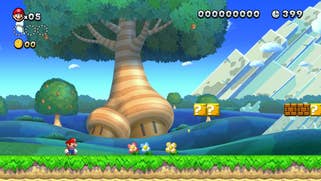
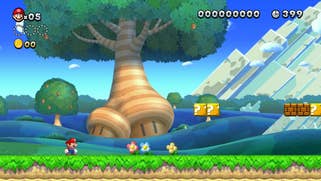
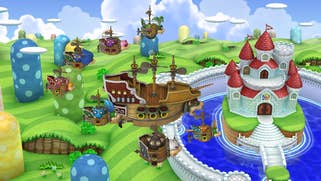
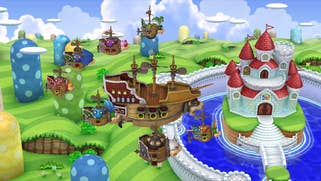
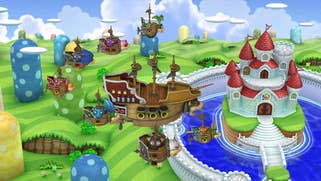
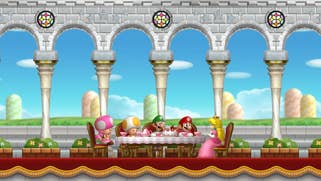
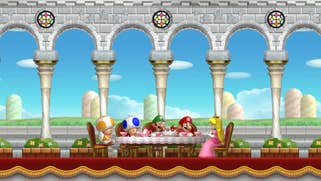
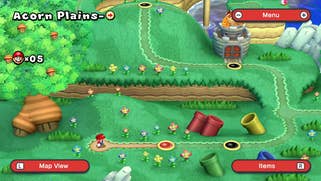
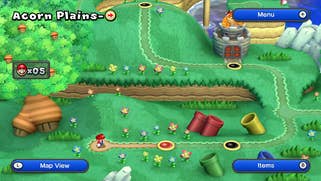
Beyond resolution, the new release offers more subtle refinements. While texture assets are unchanged, the filtering looks improved. Switch increases anisotropic filtering quality - possibly down to the resolution boost alone - and so any surface that sits at an angle relative to the camera simply looks clearer. Wii U's are often blurred, so the Switch version is pleasingly improved here. There are also some changes to geometry too: Princess Peach has a new face and hair on Switch, though the other main characters appear unchanged. Beyond this, there are higher resolution shadows underneath every character. The Wii U release could get away with aliased shadows to an extent, owing to the 720p output. At 1080p on Switch, an upgrade was really needed to match, and that's what we get, especially evident when looking at the top-down map view.
Moving onto Switch's portable play, it's an identical experience only with a resolution reduction to 720p. In the mobile configuration, Super Mario Bros U Deluxe on Switch looks identical to Wii U as played on the TV - including the blurrier texture filtering. The only gripe is that with four players on the smaller screen, the action is a bit tougher to track. But still, the option is there, and there's zero impact on performance. Speaking of which, Nintendo's push for 60fps gameplay in this series is a given and the Switch port doesn't disappoint. Having put 10 hours into it so far, and even gaming with four players in mobile mode, I've yet to see anything remotely approaching a frame-rate drop in either docked or portable play.
We've seen more ambitious conversions to Switch. On top of content additions, this release's enhancements are essentially limited to 1080p visuals, upgraded texture filtering, altered character models and better shadows. Based on prior Nintendo Switch ports, Super Mario Bros U Deluxe delivers exactly what I'd imagined it'd be going in. It's a way for Nintendo to direct attention to great work that perhaps went under the radar on Wii U. And who can blame them? This conversion is played straight, but for most people who missed the boat back in the day, it's well worth considering. For the rest of us, it's perhaps a lesser value proposition, but it remains recommended as a way to revisit a great game - now with proper portable play.
